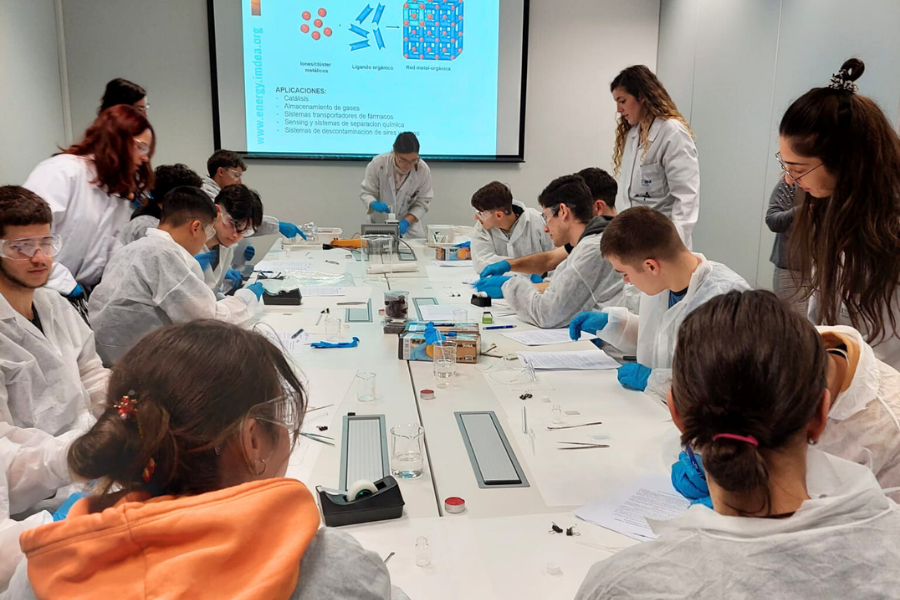IMDEA Energy opens its doors to students during Science and Innovation Week
The Science and Innovation Week is an event of scientific dissemination and citizen participation organized by the Community of Madrid through the Fundación para el Conocimiento madri+d whose objective is to actively involve society in the processes of research and development in science, technology and innovation.
IMDEA Energy Institute participates once again this year and on November 14, 15, 16 and 17, from 9:30 am to 12 noon, the Institute will welcome students from Secondary and High School who will be able to carry out the following activities:
NOVEMBER 14TH AND 15TH
From 9:30 to 12H
Biofuels workshop – Biodiesel production at laboratory scale
Biodiesel production at laboratory scale. This is a laboratory practice with an introduction in which you will learn the importance of the use of biofuels as a substitute for traditional fuels derived from petroleum, their socioeconomic and environmental advantages, the types of biofuels that currently exist and an outline of the Spanish and European legislation governing them. Next, biodiesel will be produced on a small scale from vegetable oil by means of the transesterification process. Finally, the formation of the synthesized biofuel will be quantified using an analytical technique, infrared spectroscopy (FTIR).
Electric vehicle workshop – Board game – Advantages and disadvantages compared to a gasoline car; Opportunities and disadvantages of the integration of electric car batteries into the electric grid
This is a board game in which two teams will compete in a very unique race. One team will “drive” an electric car and the other a gasoline car. The aim of the game is to raise awareness of the electric vehicle, its advantages and disadvantages depending on the type of route chosen. In addition, the opportunities and disadvantages of integrating the batteries of electric cars into the electricity grid will be explained.
Visit to the pilot plants for pyrolysis, photosynthetic microorganisms and electrochemical devices
The pyrolysis plant will be shown, a thermochemical process by which, by controlling its conditions, alternative second-generation advanced biofuels can be obtained from lignocellulosic waste (agricultural and forestry). The refining and subsequent upgrading stages of both pyrolysis oils and more traditional vegetable oils will also be shown. On the other hand, the pilot plant of photosynthetic microorganisms of the biotechnological processes unit will be shown.The different photobioreactors for microalgae cultivation (tubular and raceways) for the production of third generation biofuels will be shown, as well as reactors for the production of biogas from sewage treatment plant waste flows using the previously cultivated microalgae as substrate.Finally, the electrochemical devices test laboratory will show different energy storage devices, mainly batteries, which can be used for different applications, from mobile devices, automotive or storage linked to renewable energies.
NOVEMBER 16TH AND 17TH
From 9:30 to 12H
Calculate your own carbon footprint
The objective of this practice is to learn about the concept of carbon footprint, turning participants into agents that raise awareness among the people around them.
people around them.This calculation is based on four axes: transport, energy, consumption and urban planning.
Solar cell manufacturing workshop with dyes, artificial photosynthesis and porous materials
A thin film type photovoltaic cell will be manufactured using porous titania and some ingredients easily found in everyday life. The function of each material and the basic mechanism of the cell will be understood and these concepts will be used in the understanding of artificial photosynthesis. The importance of the use of porous materials for the acceleration of the process and its implication in the applicability of these technologies will also be emphasized.
Concentrating solar power workshop. Explanation and demonstration of different forms of CSP conversion
The activity begins with an explanation of CSP and different forms of conversion (into heat, mechanical energy, electrical energy and chemical energy). Each of the theoretical explanations is complemented with a practical demonstrator so that participants can see them in operation.



